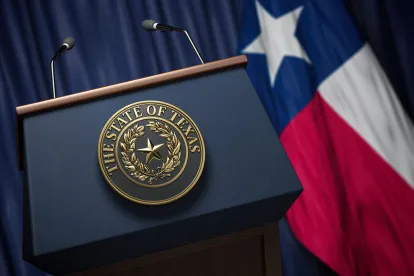A new Texas law will go into effect on September 1, 2023 that is directly aimed at curbing the discretion of local prosecutors in deciding which classes or types of cases they choose not to pursue.
H.B. 17 amends Section 87.011 of the Local Government Code by amending the definition of "Official misconduct" by a district attorney or county attorney with criminal jurisdiction (defined in the statute as a “prosecuting attorney”) to include the "adoption or enforcement of a policy of refusing to prosecute a class or type of criminal offense under state law or instructing law enforcement to refuse to arrest individuals suspected of committing a class or type of offense under state law," or allowing an attorney employed or otherwise under the control of the prosecuting attorney to do so. There are exceptions for policies that are adopted: (a) in compliance with state law, an injunction, a judgment or another court order, (b) in response to a reasonable evidentiary impediment to prosecution, or (c) to provide for diversion or similar conditional dismissal of cases when permissible under state law, such as programs that offer conditional dismissal of drug possession charges based upon successful completion of drug rehabilitation.
If there is a belief that a prosecuting attorney committed official misconduct, a petition to remove the prosecuting attorney may be filed by any resident who lives and has lived in the same county as the prosecuting attorney for at least six months and who is not currently charged with a criminal offense in that county. The petition is made to the presiding judge of the administrative judicial region where the petition is filed. The administrative judge will then assign a presiding judge and a prosecuting attorney from a different county to handle the removal proceeding. Further, H.B. 17 creates an atypical rebuttable presumption that a prosecuting attorney committed official misconduct if the prosecuting attorney has made a public statement that they adopted, enforced or intend to enforce a policy of refusing to prosecute a class or type of criminal offense under state law or instructing law enforcement to refuse to arrest individuals suspected of committing a class or type of offense under state law.
Historically, local prosecutors had wide discretion in deciding which types of cases their offices would pursue. In recent years, many local district and county attorneys have implemented policies against prosecuting criminal cases involving low volume possession of marijuana and trace amounts of drug residue. These types of policies were fairly uncontroversial. After Texas’s criminal abortion ban (Tex. H. & S. Code Sec. 170A.002) went into effect last year, a number of local prosecutors announced that they did not intend to pursue criminal cases concerning abortions. H.B. 17, while neutral on its face, may be a response to these public pronouncements concerning the abortion ban, among other issues.
We will be monitoring these developments and may provide an update in the near future on this topic.





 />i
/>i

